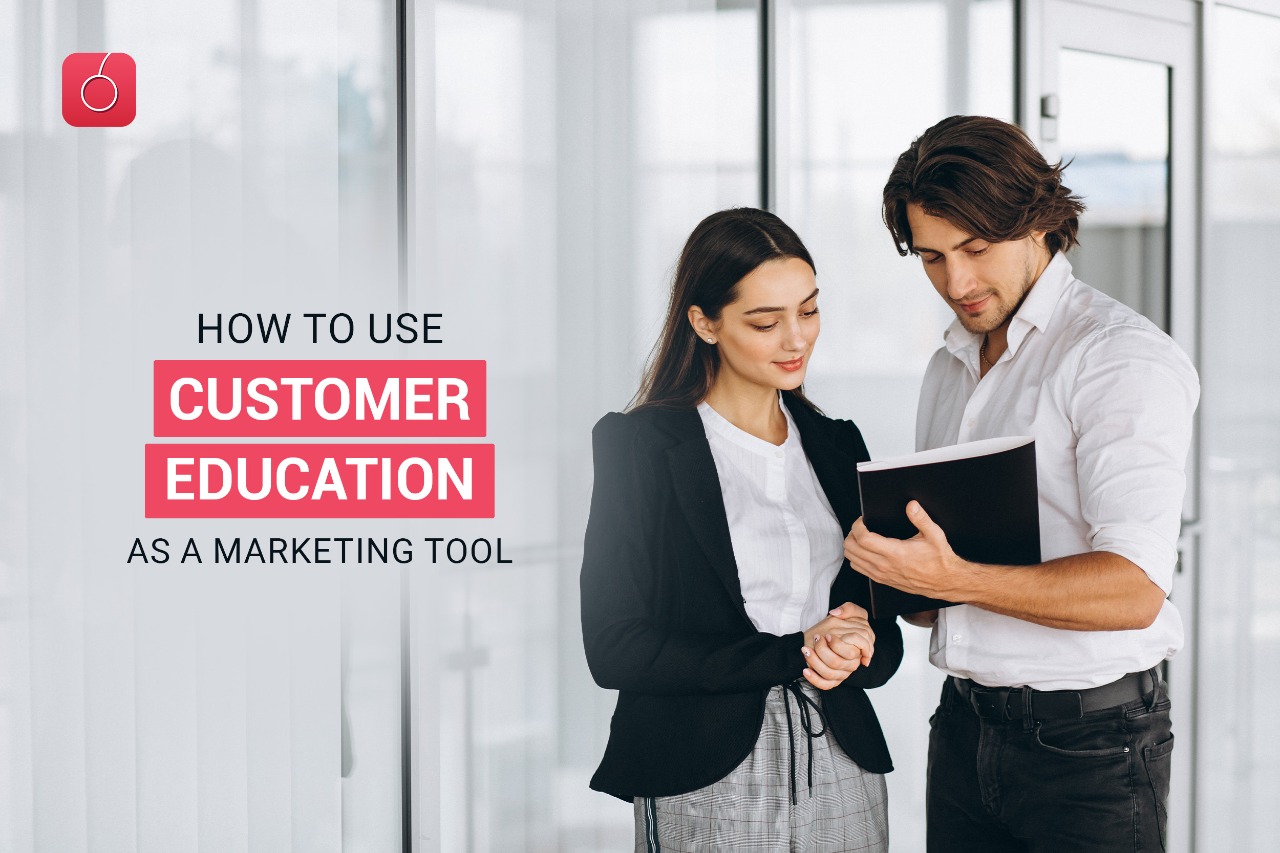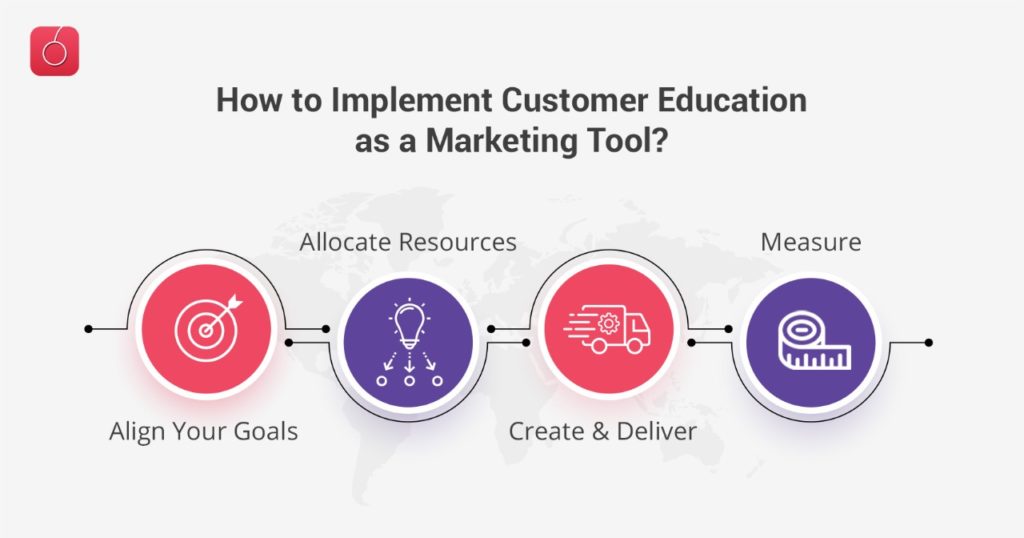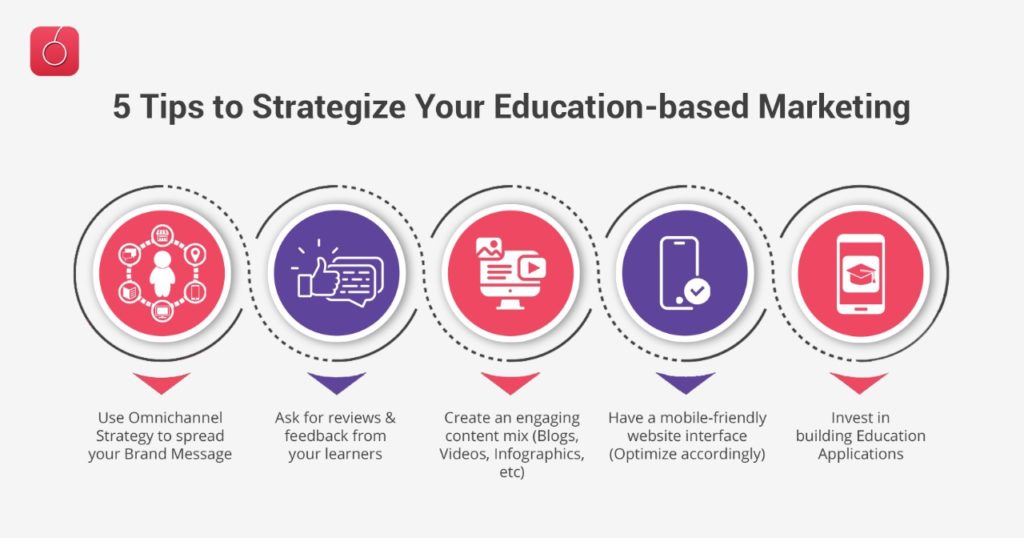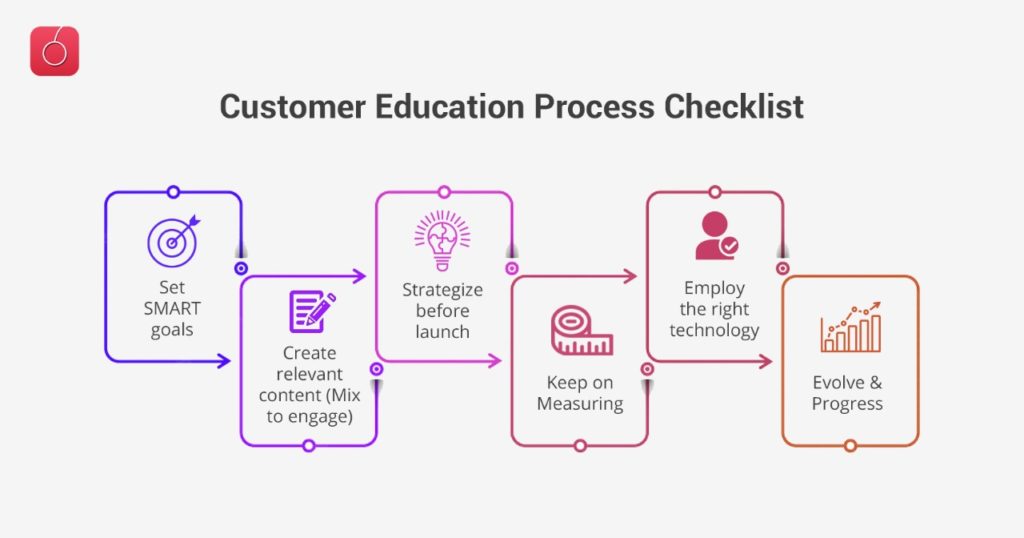Customer education, in the simplest term, is a marketing strategy. This doesn’t mean other strategies are an unreliable fit to upscale your ROI. But with global disruption and customer thought-process shift — actively “pulling” information to support their purchasing decisions, you need a more inclusive marketing strategy.
Customer education solely depends on your objectives. Whether you want to increase product adoption, generate demand for your product, increase conversion rate (free to paid users), or even prioritize having a talent pool of qualified people that uses your product. If your priorities are amongst any of above mentioned, your education must report to marketing & sales reps. So, shall we start to know about how to use customer education as a marketing tool [tips & checklist].
Importance of Customer Education
In the digital-savvy and information-driven culture, customer education is a valuable asset for any marketing team. Gone are the days when worn-out sales pitches fueled the ROI of any organization. Because, nowadays, customers are putting their necks out to educate their buying decisions. So, it all drips down to how aware are the customers of your product and services.
Recent research by New Century Media suggests that companies who invest in customer educational assets foster consumers 29 times, who are likely to buy. The best example of this is Hubspot Academy, the people who take their courses or even read their blogs are more likely to buy their offerings. So, it is not rocket science.
It is a question of consumer thought-process shift — actively “pulling” information to support their purchasing decisions. This shift in the digital culture has created a context in which consumers feel the need to engage with your products, and your services, through a deeper & meaningful, bite-size education.
Furthermore, Forbes former contributor, Steve Olenski, articulated in his Education-based Marketing blog that;
“Today’s consumers won’t do business with people they don’t trust.”
As consumers expect immediate gratification, it gets harder for them to buy unless it's on their terms and timetable. Hard fact, but true! So, for them to trust you, they need to feel assured that they are dealing with the right company that has their best interest in mind.
How to Implement Customer Education as a Marketing Tool?
1. Align Your Goals
To launch any successful customer education program, you need to understand the dynamics of the business impact it has. And to figure that out, you need to align your goals on every level of your company functions.
So, what are your priorities? To generate demand for your product? Increase your product use? Increase conversion rate (Free to paid users)? Or do you want to create a talent pool of qualified people to use your product?
After establishing above mentioned priorities for your organization — align your set goals within every hierarchy level of your organization.
- Business Goals: Conduct a whiteboard session with top leaders & decision-makers of your company to discuss traction metrics such as customer acquisition, lifetime value (LTV), and other metrics. Without the top-bottom sync, the customer education program won’t get very far.
- Departmental Goals: The impact of customer education is felt across different degrees in different departments of your company, be it, sales, marketing, and customer success team. To acquire proven results, you need re-assure what they are using as proxies for customer success, currently. Therefore, customer education will become a helpful user-level metric for them as well.
- Team Goals: Team goals are all about your sync impact. To create a win-win situation while implementing customer education, you need to convey synchronous efforts — think user-level metrics. Aligning a singular set focus & consistency will bring a great impact on your engagement rates & course completion.
2. Allocate Resources
The bluntness about customer education is you’re not going to reach your dream state, right away. Optimizing your customer education program for your unique set goals & message will take time. But that doesn’t mean you shouldn’t take the first step. To create a solid foundation and reach an educational state like the academy, you might face hurdles like lack of resources & unsatisfied response gaps.
But focus on gains, not gaps. Avoid fixing your eye on global-class academies like Hubspot when you are just starting. Focus on your gains. Be it the smallest effort today, your needle should be moving in the right direction. Because, if you’re constantly peeking out on others’ examples, you’ll struggle on your grounds. That being said, it’s cool to have an idea of what’s going around about features and resources, it’ll help you to keep the tap on current trends.
Creating your academy doesn’t necessarily mean that the resources and tools required must come from your repository and budget. Allocate resources by borrowing useful material from other departments, that might have expandable resources, you can use. For example, for any subject matter topic, you can use your specialists to shoot a quick 5-min explanatory video session.
Communicate. Communicate. Communicate. Never underestimate the power of words. Have round-table sessions (virtual works too) with your teams weekly or monthly to discuss the progress. Host theme-based events to bring & connect different departments on the same page. Yeah, you can use event fliers & memes, and paste them around the wall to let the message roll. Eventually, the intent is to bring visibility to create momentum.
3. Create & Deliver
Now you already know what kind of goals sets and business outcomes you’re aiming to drive, so the question comes, what sort of objectives will help your customer achieve through your educational assets — that’ll eventually lead to your business outcome that you've identified?
In technical terms, this is called “Learning Objectives”. After you have nailed down your learning objectives, you can start laying out the entire journey that your customer will have to accomplish their objectives. Most importantly, when you are in this stage, consider the following:
- Subject Matter: Subject Matter is perhaps the most significant decision in your customer education program, it means what you are going to educate your consumers about. As the simplest example, let’s say you wish to educate your customers about your products. But, don’t you think that’s a broad topic.
So, work with your subject matter experts to narrow down your content scope, at the start, and find priorities. Them be it in a specific feature or even a function you feel helpful.
- Content Mix: In this process, you need to conduct white sessions with your instructional designer to decide the type of content (or platform) you are going to produce. Most learners don’t respond to a heap of words, including videos, infographics, and slideshows to foster the fast-learning cognitive capacity of your consumers. The purpose is to create a dynamic learning environment, so the more creatively exciting mix it gets, the more easily it is absorbed.
- Content-Length: The concept of your perfect content mix works this far. The reality of consumers nowadays is that most of them don’t have time to sit back and invest hours at end to learn. This is why you need to find a short & snappy way to get into a 5-10mins window. Creating 7 short video sessions is way better than 1 long webinar session.
- Delivery Process: Once you align your goals, find ways to get the resources, and create the right mix & length of your content, and its delivery time. Delivery is about enabling a system that supports scaling your mapped-out customer education program. To make use of this, you need a tech stack integration to operate your education program while deploying the resources that you've developed earlier. Don’t forget to engage with your customer in their learning stages while you reach the last step to measure their progress.
4. Measure
Feedback time. Gather both qualitative and quantitative feedback to improve your customer education program. Your efforts here are to know what your customers think about your program, so keep your doors open for any kind of suggestions or feedback. You can embed survey forms at the end of each course completion section or even mail them up.
Keep on assessing your customer education progress at deeper levels, by looking into learning proficiency, operational impact, relationship growth, and even ticket cost.
5 Tips to Strategize Your Education-Based Marketing
1. Use Omnichannel Strategy to Spread Your Brand Message
To drive diverse audience interest, you need to have an omnichannel marketing strategy in place, to provide a myriad of multiple mediums (social media, website, direct mail, review websites, publicity, and even phone calls). Establish a meaningful and close connection with your consumers by reaching them where they are, mostly. An easy way is to fetch a Social Media Marketing (SMM) buyers persona in place, that will help you to segment your audience (gender, educational background, age, industry, goals, challenges, etc)
2. Ask for Reviews & Feedback from Your Learners
You got to encourage your consumers to leave feedback or review that will help to revamp your education program strategies & progress effectively. Remember to make it a fun activity by employing gamification instead of forcing their experience with your program.
3. Create an Engaging Content Mix (Blogs, Videos, Infographics, etc)
Your customer education program is simply to transform/create a perceptive about how you do business. So, don’t rely on heaps of information instead make it an exciting & engaging mix of content. (Employ Social Media Strategies aligning your content mix)
1. Have a mobile-friendly website interface (Optimize accordingly)
For any website interface to be mobile-friendly, you need to have a session with your UI/UX experts or try with your developers to fill out the gaps. Your consumer is expecting an easy-to-access & guided navigational journey, so remember to optimize your page loading time & navigable elements to be mobile-friendly.
2. Invest in building Education Applications
Applications are the safest way to produce proficient learners. It offers a sense of convenience in the learner’s journey. Creating an education-based app can help you maximize your ROI while building a community of talent - ready to use your product.
Customer Education Process
The customer Education program can take up many forms. As it's evolving with time — your approach should be unique like your product and services. As different companies have different objectives, customer education varies timely. Let’s say as we discussed your objective is to create a talent pool of proficient people that uses your product. So, options like instructional content, infographics, guidebooks, interactive weekly sessions, case studies, and product tours are super scalable educational resources to accomplish the above-mentioned objective.
Fundamentally, the question about the customer education process lies in both the educational & learning objectives. So, there is no such thing as the right format or process. Once you think about the user's journey, your customer education must shape that perceptive of understanding the stages that consumer goes through when they are using your product.
After you have decided “why” you want to educate your customers, it's time to understand “how” you’ll educate them. In this segment, you’ll need to consider different consumer journeys. If your ultimate goal is brand loyalty, there are likely various ways to get there.
All you need to create digitally-savvy and engaging educational resources and deploy them using the right technology.
Customer Education Process Checklist to Get Started
- Set SMART goals
- Create relevant content (Mix to engage)
- Strategize before launch
- Keep on Measuring
- Employ the right technology
- Evolve & Progress
Why to Use Customer Education Software in SaaS Companies?
When you streamline your educational resources, you need a suitable technology that supports your academic foundation. Getting the right technology doesn’t mean the absolute “right” but it boils down to your right or suitable tech needs.
- Artificial Intelligence: Every consumer has a broad sense of understanding of different products & services they want to use/buy. So, to narrow down such a broad sense, you need an intuitive system to analyze your audience (wherever they are) & simulate your message without human error.
- LMS (Learning Management System): Customer education is not any lesser than conducting training sessions. Without a proper dynamic system in place, information is just like words with no purpose. So, from streamlining your content and segmenting your audience (learning goals, progress meter, gamification, and objectives) to deploying your educational program (insights, content authoring tools, simulations, and big data repository) — Learning Management System becomes a necessity for any success to happen.
Depending on the objectives you want to accomplish with your customer educational program, you can employ the right technology that suits your needs.
How Does Customer Education Impact on ROI?
Customer education has the potential to impact any organization's ROI with consistent efforts & strategies in place. In the recent studies, it was found that on average companies reported a 6.2% increase in revenue whereas a 7.4% increase in customer retention led to a 6.1% decrease in customer support costs.
While customer education is observed to boost marketing & sales results, it's just a matter of strategic effort that high-success companies leverage such educational strategies to outperform the average and low-scale companies in every category, by the whopping rate of 30%, in over a year or so.
Customer Education can have an impact in different degrees, not limited to sales, but resulting in brand advocacy and an increase in LTV.
So, after such compelling evidence, a customer-first approach is needed to boost to a 16X higher increase in customer retention/satisfaction rate.
Conclusion
Regardless of the nature of your business, or your industry, customer education is the competitive edge & need of the hour for every company to adapt to the global disruption. In this blog, if you have any queries regarding the right technology to get you started with your customer education program, do let us know, we’d love to give you a free demo.

![How-to-Use Customer Education As A Marketing Tool [Tips & Checklist]](https://www.cxcherry.io/wp-content/uploads/2022/07/How-to-Use-Customer-Education-As-A-Marketing-Tool-Tips-Checklist1.png)



